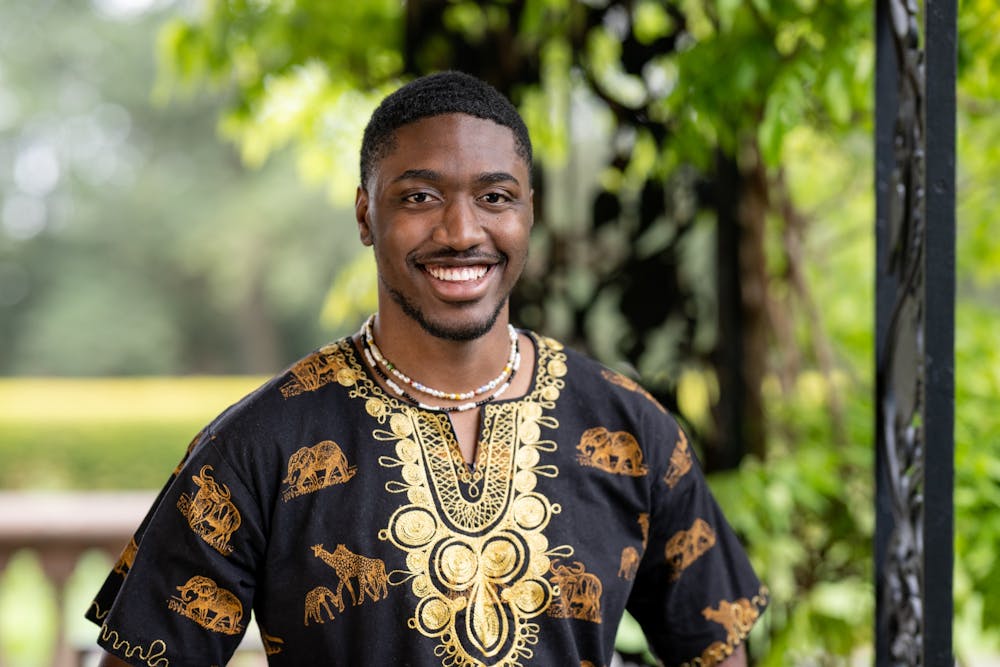Mutemwa Raphael Masheke ’23 triumphed in the final round of this year’s Young Alumni Trustee (YAT) election. Despite higher visibility, this year’s election did not see a significant increase in typically low turnout.
Outgoing Alumni Council Chair Mary Newburn ’97 announced Masheke’s victory on May 26 at the Annual Meeting of the Alumni Council.
“Each year, a member of the senior class is elected to a four year term on the board of trustees by members of the junior and senior classes, as well as the two most recent graduating alumni classes,” Newburn said. “I am pleased to announce that Mutemwa Raphael Masheke ’23 from Lusaka, Zambia is this year’s successful candidate and will begin a four-year term.”
“We look forward to seeing you back on campus regularly,” Newburn added.
Masheke is a BSE computer science concentrator from Lusaka, Zambia. During his time at Princeton, Masheke has also been a RCA for Butler College, served on the student advisory board for the Council for Science and Technology, and as vice president of the Society of African Internationals at Princeton and the Princeton Chapter of the National Society for Black Engineers.
Upon hearing that he would be serving as the next YAT, Masheke noted that he experienced both excitement and awe. “I heard my hometown ‘Lusaka, Zambia’ announced and I was like ‘Woah, we have a Zambian, Black and Low Income student on the board of trustees?.’ I thought about how I would have never imagined this to be possible growing up,” he wrote in a statement to the Daily Princetonian.
Candidates Caroline Kirby ’23, Mayu Takeuchi ’23, and Masheke were all finalists who moved on to the general election after the primary election, in which only the senior class voted online from March 21 through March 30.
In a statement to the Daily Princetonian, Takeuchi wrote “I’m excited for Mutemwa, and I have full faith that he will further elevate diverse perspectives historically underrepresented in our Board of Trustees.”
Kirby did not respond to a request for comment in time for publication.
The general election ran from April 25 to May 17 and the electorate was composed of all members of the Classes of 2021, 2022, 2023, and 2024. According to University Spokesperson Michael Hotchkiss, “a total of 22% of the electorate participated in this year’s election (including 38% of the senior class).”
In the 2022 Young Alumni Trustee election, 19 percent of the electorate participated.
In Masheke’s YAT candidate bio, Masheke noted how he has worked with students and faculty to subsidize summer housing for low-income students, pioneer initiatives to expand career opportunities for students of color, and improve financial aid for international students. This work earned Masheke the 2022 Peer-to-Peer Leader of the Year in Diversity, Equity and Inclusion and the 2023 African Vanguard Award from the Program in African Studies.

As the newly elected YAT, Masheke wrote, “I'm definitely humbled.”
“This election has reminded me of the importance of listening and valuing the diverse experiences of others,” he continued.
The YAT election process has been controversial, as candidates are not allowed to publicly campaign or take issues on campus issues. As a result, students have commented on the lack of available information about the students running for the position during the voting process. Benjamin Gelman ’23, another YAT candidate in the first round, spoke out against the process in the weeks leading up to the election.
Masheke wrote to the ‘Prince’ about the potential shortcomings of an election where student candidates cannot campaign. “Given how diverse the candidate pool is of this election, it's worth it to consider the difficulty of discussing a candidate's life experiences amidst a no ‘issue based campaigning’ policy,” he wrote.
“Coupled with how long it takes, it can definitely take a toll on you if you have to carefully navigate conversations about the election in ways that feel unnatural,” he continued.
Takeuchi expressed a similar sentiment — “While I think the prohibition on issue-based campaigning makes sense, given Trustees’ broad, long-term, and high-level scope of responsibility, I also believe there needs to be greater space for YAT candidates to demonstrate what type of trustee they would be if elected.”
She noted that there are certain questions students should be able to have answered about their future YAT, such as “What values and principles would guide your work?”
Newburn also announced two new elected trustees, Kamil Ali-Jackson ’81 from West Chester, Pa. and graduate school alumna Nandi O. Leslie GS ’05 from Bethesda, MD, who will join the board on July 1.
Ali-Jackson is a lecturer at the University of Pennsylvania Carey Law School, a board member of two pharmaceutical companies and a member of the Princeton University Research External Advisory Council for Innovation and Entrepreneurship. Leslie is an adjunct professor in Applied and Computational Mathematics at Johns Hopkins University and the Director of Cybersecurity Technology Solutions at Raytheon Technologies.
Including Masheke, all three new trustees are Black.
There is no published data on the historic racial makeup of the Board of Trustees. The board has become more racially diverse since the first Black trustees served in 1969.
According to data recently compiled by The Daily Princetonian, the board, including many prominent campus donors, does tend to skew wealthier, with more than 25 percent of trustees having a net worth above $10 million.
Masheke will begin his four-year term on July 1.
Annie Rupertus is an associate news editor for the ‘Prince.’
Isabel Yip is a head news editor for the ‘Prince.’
Please send any corrections to corrections[at]dailyprincetonian.com.








